Please refer to MCQ Questions Chapter 10 Internal Trade Class 11 Business Studies with answers provided below. These multiple-choice questions have been developed based on the latest NCERT book for class 11 Business Studies issued for the current academic year. We have provided MCQ Questions for Class 11 Business Studies for all chapters on our website. Students should learn the objective based questions for Chapter 10 Internal Trade in Class 11 Business Studies provided below to get more marks in exams.
Chapter 10 Internal Trade MCQ Questions
Please refer to the following Chapter 10 Internal Trade MCQ Questions Class 11 Business Studies with solutions for all important topics in the chapter.
MCQ Questions Answers for Chapter 10 Internal Trade Class 11 Business Studies
Question. The persons who come in between the primary producer and the final consumer to promote trade is called as ________
(a) Trader
(b) Middleman
(c) Auctioneer
(d) Agent
Answer
B
Question. If there is no trade is also called as _______
(a) Situation autarky
(b) situation of equilibrium
(c) situation of autokey
(d) none
Answer
C
Question. Which do not come in fixed retail sellers:
(a) General store
(b) Departmental store
(c) Hawkers and pedlars
(d) Chain stores.
Answer
C
Question. It helps disabled and elderly people.
(a) Tele-shopping
(b) E-commerce
(c) multiple shop
(d) installment system
Answer
A
Question. International trade contributes and increases the world
(a) Population
(b) Inflation
(c) Economy
(d) Trade Barriers
Answer
C
Question. Which one of the following is not amongst India’s major trading partners?
(a) Germany
(b) New Zealand
(c) UK
(d) USA
Answer
B
Question. Street traders are also called as:
(a) Hawkers
(b) Market traders
(c) Pavement traders
(d) None of the above
Answer
C
Question. A warehouse keeper accepts goods for the purpose of ____________
(a) Selling
(b) Packaging
(c) Export
(d) Storage
Answer
D
Question. Each retail shop of a chain network has a________who supervises it:
(a) Branch manager
(b) Store head
(c) Owner of the chain store
(d) None of the above
Answer
A
Question. A shop selling kid’s wear is an example of
(a) street traders
(b) street shops
(c) speciality store
(d) single line stores
Answer
C
Question. It is a network of a number of branches situated at different localities in the city or in the different parts of the country.
(a) Multiple shop
(b) Consumers? co-operative store
(c) Hire purchase system
(d) Internet marketing
Answer
A
Question. Wholesaler?s deals in __ quantity of goods
(a) Small
(b) Limited
(c) Large
(d) Medium
Answer
C
Question. Wholesalers act as a link between_______and_______:
(a) Manufacturer and customer
(b) Retailer and customer
(c) User and manufacturer
(d) Manufacturer and retailer
Answer
D
Question. The aim is to economies by buying in common and to retain their profits by selling in common.
(a) multiple shop
(b) web marketing
(c) teleshopping
(d) consumer?s co-operative store
Answer
D
Question. An agent is appointed by the ____________
(a) Principal
(b) Manufacturer
(c) Wholesaler
(d) Retailer
Answer
A
Question. Which one is not the tax slab of GST?
(a) 5%
(b) 14%
(c) 18%
(d) 28%
Answer
B
Question. All the branches of chain stores are controlled by
(a) Branches themselves
(b) Head office
(c) Government
(d) General manager of each branch
Answer
B
Question. Which one of the following is the fixed shop small retailers?
(a) Departmental stores
(b) Speciality shops.
(c) Itinerant retailers
(d) Market traders.
Answer
B
Question. What is the exemption limit for a person to pay GST?
(a) 10 Lakh
(b) 30 Lakh
(c) 40 Lakh
(d) 20 Lakh
Answer
C
Question. The type of retail business acts as a supplier of a wide variety of products under one roof:
(a) Departmental store
(b) Chain-store
(c) Mail-order house
(d) Multiple-shop
Answer
A
Fill in the blanks:
Question. Due to its big size the departmental stores enjoy _________ form of Pvt. Sector enterprise.
Answer
Joint form Company
Question. Small producers or petty traders carrying their products on bicycle or on their heads are referred to as _________ .
Answer
Itinerant
Question. GST payable on all interstate supply of goods and services is ___________.
Answer
GST
Question. Trade between two and more countries is called ________ trade.
Answer
External
Question. All the branches of chain stores are controlled by the _________ .
Answer
Headoffice
Question. Stores which are found in a local market and residential areas are called _________ .
Answer
General Stores
Question. The traders who do not have fixed place of business and they keep on moving with their waves are called ________ retailers.
Answer
Itinerant
True / False:
Question. The territorial spread of GST is the whole country, Excluding Jammu & Kashmir.
Answer
False
Question. General stores remain open for 24 hours.
Answer
True
Question. Wholesalers provide after-sale services to the consumers in the form of home delivery of goods.
Answer
False
Question. The total area covered by a street stall holders is very limited.
Answer
True
Question. Departmental stores provides maximum service to higher class of customers for whom price is secondary.
Answer
True
Question. There are three tax slabs applicable in GST.
Answer
False
Match the following:
Question. On the basis of nature of trade
| 1. Buying and selling of goods between two or more countries | (a) Internal trade |
| 2. Trading taking place with in the boundary of a country | (b) Entreport |
| (c) External trade |
Answer
1-(c), 2-(a)
Question. On the basis of services of wholesaler to manufacturer
| 1. They unable the producers to take the advantage of economies of scale | (a) Financial assistance |
| 2. They deal in goods in their own name and covers variety of risks | (b) Bearing risk |
| (c) Facilitating large scale production |
Answer
1-(c), 2-(b)
Question. On the basis of services of retailer to consumers
| 1. Enables the buyer to buy the product as and when needed | (a) After sale services |
| 2. Providing services like home delivery, supply of spare parts | (b) New product information |
| 3. Provide information about special features of new products and effective display | (c) Expert advice |
| (d) Regular availability of Products |
Answer
1-(d), 2-(a), 3-(b)
Question. On the basis of services of wholesalers to manufacturers
| 1. Wholesaler provide retailers with time utility | (a) Facilitating large scale production |
| 2. They help to maintain the demand of goods by purchasing as and when produced | (b) Storage |
| (c) Facilitate production continuity |
Answer
1-(b), 2-(c)
Question. On the basis of services of wholesaler to retailer
| 1. Helps them to manage their business with relatively small amount of working capital | (a) Specialized knowledge |
| 2. Advise them on the décor of retail outlet and inform about new products, their uses etc. | (b) Risk sharing |
| (c) Grant of credit |
Answer
1-(c), 2-(a)
Question. On the basis of the services of retailer to consumer
| 1. Provides the consumer with choices out of many options | (a) After-sale service |
| 2. Situated near to residential areas and remain open for long hours | (b) Regular availability of products |
| (c) Wide selection | |
| (d) Convenience in buying |
Answer
1-(c), 2-(d)
Pictorial Questions:
Question. Identify the tax introduced in the given picture.
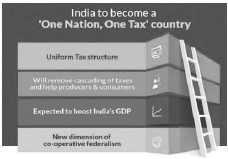
Answer
GST
Question. Give the full form of the given abbreviation.
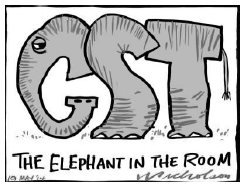
Answer
Goods and service tax
Question. Identify the feature of GST mentioned in the picture.

Answer
GST is applicable on supply of goods and service
Question. What is the territorial applicability of GST according to the given picture?
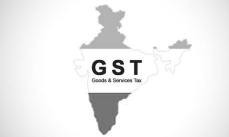
Answer
Whole country including Jammu and Kashmir
Question. Give the year in which the identified tax has been applicable.
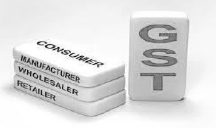
Answer
2017
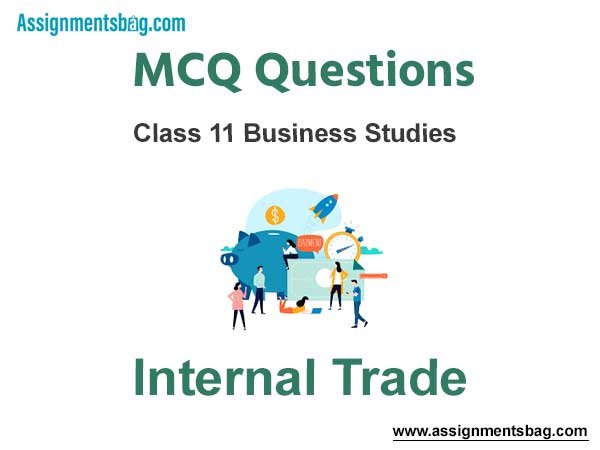
We hope you liked the above provided MCQ Questions Chapter 10 Internal Trade Class 11 Business Studies with solutions. If you have any questions please ask us in the comments box below.


